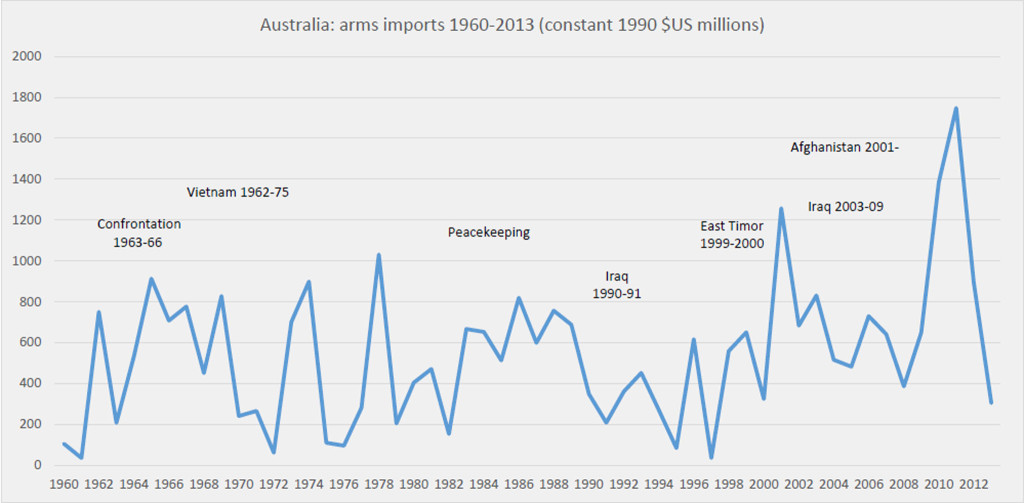‘From the Honest History vault: Does Defence spending lead to war, and does it make any sense against pandemics?’ Honest History, 2 July 2020 updated
Update 3 July 2020: Former Defence Secretary, Paul Barratt, in Inside Story on the defence announcement.
An important problem with the government’s worldview [says Barratt] — admittedly shared widely in the defence community — is that the solution to every military problem is to strengthen what prime minister Scott Morrison referred to yesterday as “our ever-closer alliance with the United States.”
***
Yesterday’s announcement about Defence spending will be thoroughly analysed elsewhere. Here, though, is another question which we should ask: does spending all that money on defence push us inevitably towards wars where we will need to use it?
This was a question we asked some time ago on Honest History, first in 2014 and again in 2016, after the Defence White Paper. Summarised, the issues are as follows:
- Will ‘sunk costs’ provide an impetus towards the use of arms in combat? (In other words, will there be a disinclination to ‘waste’ all this investment?)
- Will the desire for a return on investment in arms influence military advice to governments which are considering involvement in war?
- Will the concern to achieve a return on investment also influence the response of governments to military advice?
- Will further pressure toward war come from the military desire to work successfully in combat environments with sophisticated ‘kit’, leading to promotion prospects for some and experience and training for all?
- Will there be a desire in government to support such opportunities for the military?
- Will arms sellers encourage moves to war to provide opportunities for ‘demonstrations in use’ of their products, leading in turn to future sales?
- Will the ‘return on investment’ and the ‘eternal expenditure’ spurs continually reinforce each other?
- Given the weight of all these drivers, to what extent will the desire not to place personnel ‘in harm’s way’ work as a countervailing factor?
We put together this graph about the relationship between arms imports to Australia – that is, it does not include locally manufactured equipment – and Australian military involvement overseas between 1960 and 2013.

The further question arises: what good is a ballistic missile or beefed-up naval power against coronavirus or any similar future pandemic? Sue Wareham, President of Medical Association for Prevention of War (MAPW), asked questions like this in recent articles in Pearls and Irritations: ‘Healthcare not warfare‘ in April 2020; ‘Prioritising health‘ in May 2020. In the latter article, Dr Wareham wrote:
Global military spending continues to rise. Critical health goals could be achieved for a fraction of what we spend on wars. Focussing funding on health rather than military spending, globally and in Australia, would create more jobs, healthier communities, and budgetary savings …
Australia’s military spending skyrockets, with over [A]$200 billion for military hardware planned over the decade to 2028-29 [and more, following yesterday’s announcement], over and above the annual defence budget. While St Vincent’s Hospital in Melbourne had to appeal to the public for emergency funds recently for new ventilators and other supplies, no such measures are needed by the weapons industry; the funds just flow and keep flowing. The estimated lifetime cost of building and maintaining our 12 new submarines has reached a staggering [A]$225 billion.
MAPW also made a statement, as did the Independent and Peaceful Australia Network (IPAN).
We the undersigned [said IPAN], call on the Australian Government to stop funnelling billions of dollars into offensive weapons for unjust U.S. led wars, and invest instead in the health and safety of people and the environment …
COVID-19 has sharply exposed the dangerous and unsustainable priorities of our society. On the other hand, the vast majority of Australians are co-operating to control the virus. World-wide, there are desperate shortages in the supply of most basic safety and life saving equipment – ICU beds, ventilators, virus testing kits and personal protective equipment for front line health workers. At the same time there are vast stockpiles of technologically advanced military weaponry worth trillions of dollars, waiting to be used in endless profit-making wars.
* David Stephens is editor of the Honest History website.